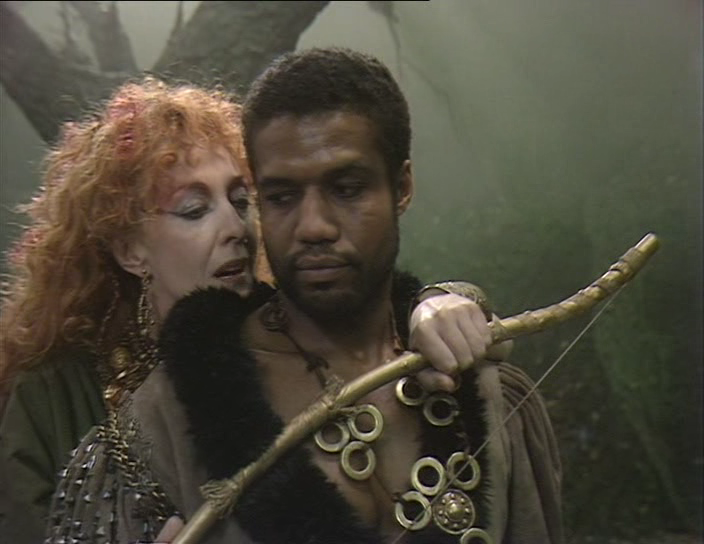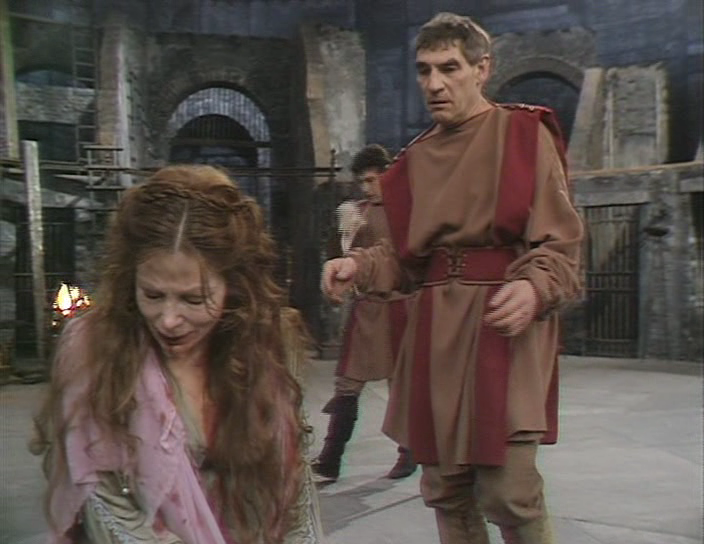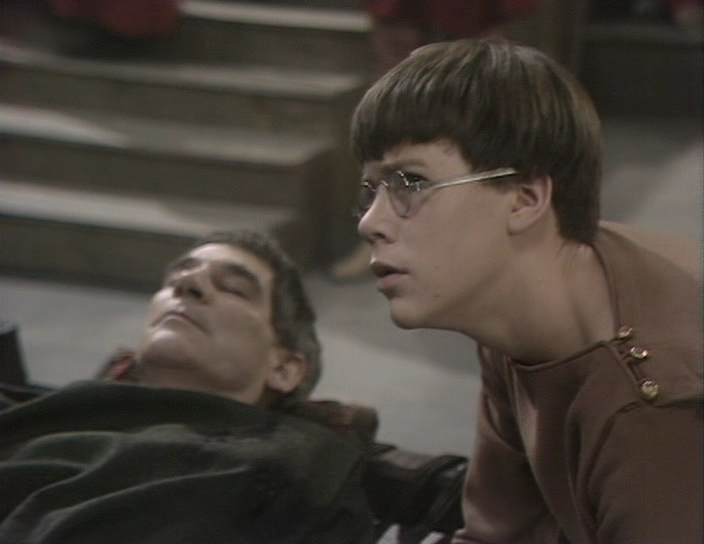

Making its debut with Romeo and Juliet on 3 December 1978, and concluding nearly seven years later with Titus Andronicus on 27 April 1985, the BBC Television Shakespeare project was the single most ambitious attempt at bringing the Bard of Avon to the small screen, both at the time and to date.
Producer Cedric Messina was already an experienced producer of one-off television Shakespeare presentations, and was thus ideally qualified to present the BBC with a daunting but nonetheless enticingly simple proposition: a series of adaptations, staged specifically for television, of all 36 First Folio plays, plus Pericles (The Two Noble Kinsmen was considered primarily John Fletcher's work, and the legitimacy of Edward III was still being debated).
The scale of Messina's proposal, far greater than that of previous multi-part Shakespeare series such as An Age of Kings (BBC, 1960) and Spread of the Eagle (BBC, 1963), required an American partner in order to guarantee access to the US market, deemed essential for the series to recoup its costs. Time-Life Television agreed to participate, but under certain controversial conditions - that the productions be traditional interpretations of the plays in appropriately Shakespearean period costumes and sets, designed to fit a two-and-a-half-hour time slot.
The running-time requirement was swiftly jettisoned when it became clear that the major tragedies in particular would have suffered severely, but other artistic restrictions remained largely in place throughout. Although later productions under Messina's successors Jonathan Miller and Shaun Sutton would be more experimental, Miller was unable to persuade first-choice directors such as Peter Brook and Ingmar Bergman to take part, and Michael Bogdanov resigned from Timon of Athens (eventually tx, 4/16/1981, with Miller himself directing) after his modern-dress interpretation was considered too radical a departure.
This gave the BBC Television Shakespeare cycle the reputation of being overly staid and conventional, which was not always deserved. Though Messina's own productions (1978-80) were largely conservative, Jonathan Miller (1980-82) revamped things both visually (thanks to a design policy of sourcing sets and costumes from great paintings of the era in which the play was set) and in terms of direction and casting, in some cases using popular actors with little or no Shakespeare experience (John Cleese as Petruchio, Bob Hoskins as Iago) to attract new and younger audiences.
Under Miller, directors such as Jack Gold, Jane Howell and Elijah Moshinsky were encouraged to be more adventurous, with Howell in particular adopting such a stylised approach for The Winter's Tale (tx. 8/2/1981) and the Henry VI/Richard III cycle (tx. 2-23/1/1983) that they pushed the definition of "traditional" to the limit, but also garnered the series some of its best reviews. Miller's aesthetic policies continued under Shaun Sutton (1982-85), who brought the project to a belated close.
Whatever its artistic reputation, there was no doubt that the BBC Television Shakespeare was a commercial triumph, breaking even financially by 1982 (ahead of expectations) and fully justifying Messina's gamble. Its success was helped by the rapid growth of video recorders in schools, creating a secondary market that was much bigger than initially predicted - though the initial decision to sell the plays only as a complete set provoked complaints from people who baulked at paying the substantial asking price because they were after a smaller selection or individual titles. The BBC eventually released some of the more popular titles separately, but it was not until late in 2005 that the entire series was available individually on DVD at a competitive price.
Although the BBC Television Shakespeare project as a whole met with a mixed reception, it had several positive virtues. Chief among them was the fact that its completist remit meant that several of the more obscure plays received their first television adaptation, and in most cases the BBC version remains the only one. Happily, such productions as Henry VIII (tx. 25/2/1979), Cymbeline (tx. 10/7/1983), Pericles (tx. 11/6/1984) and Titus Andronicus were considered amongst the cycle's most impressive achievements, with Henry VIII subsequently voted the best production of all by the Shakespeare Association of America.
A complete list of BBC Television Shakespeare productions is as follows:
Series One (producer: Cedric Messina): Romeo and Juliet (tx. 3/12/1978), Richard II (tx. 10/12/1978), As You Like It (tx. 17/12/1978), Julius Caesar (tx. 11/2/1979), Measure For Measure (tx. 18/2/1979), Henry VIII (tx. 25/2/1979)
Series Two (p. Cedric Messina): Henry IV Part One (tx. 9/12/1979), Henry IV Part Two (tx. 16/12/1979), Henry V (tx.23/12/1979), Twelfth Night (tx. 6/1/1980), The Tempest (tx. 27/2/1980), Hamlet (tx. 25/5/1980).
Series Three (p. Jonathan Miller): The Taming of the Shrew (tx. 23/10/1980), The Merchant of Venice (tx. 17/12/1980), All's Well That Ends Well (tx. 4/1/1981), The Winter's Tale (tx. 8/2/1981), Timon of Athens (tx. 16/4/1981), Antony and Cleopatra (tx. 8/5/1981)
Series Four (p. Jonathan Miller): Othello (tx. 4/10/1981), Troilus and Cressida (tx. 7/10/1981), A Midsummer Night's Dream (tx. 13/12/1981)
Series Five (p. Jonathan Miller, Shaun Sutton): King Lear (tx. 19/9/1982), The Merry Wives of Windsor (tx. 28/12/1982), Henry VI Part One (tx. 2/1/1983), Henry VI Part Two (tx. 9/1/1983), Henry VI Part Three (tx. 16/1/1983), Richard III (tx. 23/1/1983), Cymbeline (tx. 10/7/1983)
Series Six (p. Shaun Sutton): Macbeth (tx. 17/10/1983), The Comedy of Errors (tx. 24/12/1983), The Two Gentlemen of Verona (tx. 27/12/1983), Coriolanus (tx. 21/4/1984), Pericles (tx. 11/6/1984)
Series Seven (p. Shaun Sutton): King John (tx. 24/11/1984), Much Ado About Nothing (tx. 30/11/1984), Love's Labour's Lost (tx. 5/1/1985), Titus Andronicus (tx. 27/4/1985)
The BBC also produced Shakespeare in Perspective, an accompanying series of 25-minute personal introductions to individual plays by an eclectic range of presenters from the literary (Anthony Burgess, Dennis Potter, Jilly Cooper) to the scholarly (Germaine Greer, Frank Kermode, Michael Wood) to the celebrity (Roy Hudd, George Melly, Barry Took). These usually took the form of straight-to-camera addresses from assorted locations with some connection to the play, which were intercut with extracts from the accompanying BBC Shakespeare production, usually screened later that evening.
Michael Brooke
For the BBC Television Shakespeare, tx. 27/4/1985, colour, 167 mins
Director Jane Howell
Production Companies BBC Television, Time-Life Television
Producer Shaun Sutton
Designer Tony Burrough
Music Dudley Simpson
Cast: Trevor Peacock (Titus Andronicus); Eileen Atkins (Queen Tamora); Anna Calder-Marshall (Lavinia); Brian Protheroe (Saturninus); Hugh Quarshie (Aaron); Edward Hardwicke (Marcus); Gavin Richards (Lucius)
The great Roman general Titus Andronicus returns from the wars in triumph, but is comprehensively outmanoeuvred by wily politicians, and his family pays a ghastly price for his naïveté.

The last BBC Television Shakespeare production, Titus Andronicus was broadcast several months after the rest of the final series, prompting speculation as to whether the play's graphic limb-lopping, rape and cannibalism were too much for an increasingly censorious cultural environment. In fact, a BBC strike had postponed the taping, which had the happy side-effect that when director Jane Howell finally entered the studio, her actors were unusually familiar with her interpretation. Widely regarded as one of the most successful BBC Shakespeare productions, Howell's Titus garnered particular praise for its intelligent and unsensationalised approach to a notoriously troublesome text.
After contemplating a production explicitly set in Northern Ireland (which, although potentially fascinating, would have broken the series' ground rules), Howell settled for a semi-stylised approach reminiscent of her acclaimed Henry VI/Richard III cycle, with one huge set standing in for the play's various locations. She also added a dramatic device not in the text: that of imagining the play as seen through the horrified eyes of Lucius, Titus' grandson (a device adopted by Julie Taymor for her otherwise quite different feature film Titus, US/Italy, 1999).

The major challenge in staging Titus Andronicus is that the relentless piling-up of horror upon horror frequently teeters on the edge of outright farce (Shakespeare himself emphasises this when he has Titus laughing hysterically at the realisation that he has cut off his own hand only to receive his sons' severed heads as a very poor exchange). Howell's production acknowledges this - especially in the scenes with Hugh Quarshie's unusually jovial Aaron - but she offsets the excesses with ritualised solemnity, especially in the opening and closing scenes where bodies are laid out in the Andronici tomb as the survivors reflect on their loss.

Trevor Peacock, whose gravelly voice suggests a lifetime of shouting battlefield orders, previously played Talbot and Jack Cade for Howell's Henry VI cycle. His Titus has elements of both: the noble warrior turned vengeful near-anarchist as events push him beyond what any man can endure, his cleaving to longstanding tradition (even to the point where it involves personally killing family members) rendered pointless when faced with Machiavellian politicians. In this, he's set against Brian Protheroe's giggling, immature Saturninus and Eileen Atkins' Tamora, whose ruthlessly logical presentation of her rationale for letting her sons rape and mutilate Titus' daughter Lavinia (Anna Calder-Marshall) is one of the play's most chilling moments.
Michael Brooke
http://rapidshare.com/files/114664439/TITUS_ANDRONICUS_BBC_.part01.rar
http://rapidshare.com/files/114665421/TITUS_ANDRONICUS_BBC_.part02.rar
http://rapidshare.com/files/114667738/TITUS_ANDRONICUS_BBC_.part03.rar
http://rapidshare.com/files/114668964/TITUS_ANDRONICUS_BBC_.part04.rar
http://rapidshare.com/files/114670136/TITUS_ANDRONICUS_BBC_.part05.rar
http://rapidshare.com/files/114671247/TITUS_ANDRONICUS_BBC_.part06.rar
http://rapidshare.com/files/114673314/TITUS_ANDRONICUS_BBC_.part07.rar
http://rapidshare.com/files/114674878/TITUS_ANDRONICUS_BBC_.part08.rar
http://rapidshare.com/files/114675890/TITUS_ANDRONICUS_BBC_.part09.rar
http://rapidshare.com/files/114676840/TITUS_ANDRONICUS_BBC_.part10.rar
http://rapidshare.com/files/114677779/TITUS_ANDRONICUS_BBC_.part11.rar
http://rapidshare.com/files/114678726/TITUS_ANDRONICUS_BBC_.part12.rar
http://rapidshare.com/files/114678938/TITUS_ANDRONICUS_BBC_.part13.rar
no pass



0 comments:
Post a Comment